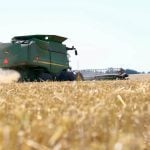Allen Xue is a patient man.
About 26 years ago Xue discovered a novel fungus on the lower leaf of a field pea plant, while he was working as a plant pathologist with Agriculture Canada in Morden, Man.
Xue later learned the fungus, a strain of Clonostachys rosea called ACM941, protected the plant. It attacked disease pathogens that were trying to infect the field peas.
Subsequent testing showed that ACM941, when applied as a seed treatment, protected peas, soybeans and other crops from root rot. As well, when ACM941 was sprayed on wheat, it reduced incidence of fusarium head blight and lowered mycotoxin levels in the grain.
Read Also

Canadian farmers need level playing field for regulations – says Minister MacDonald
Federal agriculture minister Heath MacDonald is urging the Canadian Food Inspection Agency and the Pest Management Regulatory Agency to speed up their decision making.
In 2000, Xue patented the technology in Canada and received a U.S. patent in 2002.
But, two decades later, ACM941 is still not registered as a pest control product in Canada or the U.S. and it’s not available to farmers.
Xue said the situation is frustrating because he doesn’t hear from the company that’s trying to commercialize ACM941. He doesn’t know why the bio-fungicide hasn’t been registered.
“There is no connection between the (scientists) and the commercialization (process),” said Xue, who still works for Agriculture Canada as a plant pathologist at the Ottawa Research and Development Centre.
Adjuvants Plus, a small crop protection company in Kingsville, Ont., holds the commercial rights to ACM941.
Agriculture Canada awarded it the licence in 2014.
“This natural mode of action can be used to control the devastating fusarium head blight in cereals and may find applications in many field and horticultural crops, including those in the greenhouse industry,” Adjuvants Plus said in August of 2014. “(FHB) has cost Canada’s wheat growers $1.5 billion since the 1990s….We are pleased to play a role in helping growers prevent this devastating disease in wheat with support from Agriculture and Agri-Food Canada.”
However, five years and seven months after getting the commercial licence, Adjuvants Plus hasn’t registered the bio-fungicide.
Adjuvants Plus applied for a joint Canada-U.S. registration of the product in the summer of 2017, but the company pulled the submission a year later.
They lacked sufficient toxicology and environmental toxicology data on ACM941.
“You have to do a bunch of tox and eco-tox studies, in order to get approval,” said chief executive officer Laurent Dumaine, who joined Adjuvants Plus in January 2019 after working at DuPont Canada for years.
“We had to withdraw the submission. That was in the summer of 2018. Now we’re in the process of re-doing the submission. And we’re going to do separate Canada and U.S. submissions…. We’re going to be submitting… reasonably soon.”
If all goes well, Dumaine hopes that ACM941 will receive a Canadian registration in the fall of 2021.
If it is registered next year, it will be 27 years from discovery to commercialization. That’s disappointing since Agriculture Canada identified the bio-fungicide as a priority about a decade ago. Documents on the Ag Canada website says ACM941 could “greatly reduce” the use of conventional fungicides and resistance to fungicides.
“Under field conditions, (it) reduced FHB index by 30–46 percent, FDK by 31–39 percent and DON by 22–33 percent…. Results of this study suggest that (it) is a promising biocontrol product that may be used in combination with cultivar resistance for managing FHB in wheat,” Ag Canada said. “Due to the significance of this disease (FHB) and the promising data from this work, grower representatives selected ACM941-CL01 as a Pest Management Centre priority for biopesticides regulatory support… in March 2010.”
The commercialization of the bio-fungicide went off the rails in the early 2010s. In the 2000s, Ag Canada partnered with ICUS Canada, a Newfoundland company, to develop ACM941. After several years of testing and improving the product, ICUS Canada went bankrupt in 2012.
That forced Ag Canada’s Office of Intellectual Property and Commercialization to start over. They put the technology up for tender.
More than 10 companies were interested in commercializing ACM941 and Adjuvants Plus won the competition.
The company is small, as its website lists Dumaine and three other employees.
Despite the delays in getting it to market, Dumaine remains confident in the biofungicide.
In fact, 2021 may be the right time to launch ACM941.
“I couldn’t dispute the (notion) that it’s taken a long time,” he said. “(But) the appetite for this technology didn’t exist 25 years ago. And not even seven to eight years ago.”
That’s because growers are accustomed to synthetic fungicides. Now that fungicide resistance has become a problem, Canada’s ag industry may be ready for a bio-fungicide.
“The market acceptance is really just taking off now,” Dumaine said. “We’re excited… about getting it in the hands of Canadian growers.”
For his part, Xue is tired of waiting. Most agricultural scientists love discovery — finding a new product or technology and proving that it works. But another motivation is making a difference.
Xue spent thousands of hours in the lab and the field studying ACM941, because he wanted to improve the lives of Canadian farmers.
That may finally happen in 2022.















